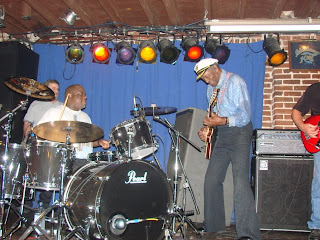It was forty years ago today—(which has the makings of a good song all by itself—something about a musician who goes in and out of style, but always manages to raise at least a couple of smiles during a short set)—anyway, forty years ago, December 22, 1969, when Chuck Berry recorded two of my favorite Chuck Berry songs—“Tulane,” and “Have Mercy Judge.”
The songs are bookends, of course—“Tulane” being the fast moving rocker, and “Have Mercy Judge” the consequence—one of Chuck Berry’s best original blues.
Both songs appeared on the album “Back Home,” which, of course, I love. It’s got extra sentimental value for me because it was my second Chuck Berry album, after the collection of hits called “Golden Decade.” But it’s a great album anyway—at least by Chuck Berry “album” standards. (How much better can you do that a record with three great songs, two or three very good ones, and none that are downright bad?) And then you top it off with a cohesive sound? Unheard of!
It was quite a lineup, with Lafayette Leake (of “Johnny B. Goode” fame) back on piano, Phil Upchurch on bass, Bob Baldori on harmonica, and Chuck Berry at the top of his game on guitar.
According to the list in the back of Berry’s own Autobiography the crew recorded everything from the album “Back Home” at the same session—which seems impossible. Fred Rothwell has the second set happening several months later in springtime. Based on little evidence I’m siding with Berry and thinking that the whole record was done in a couple of days at about the same time—and most likely in December given that one of the songs is a lonesome bluesy number called “Christmas.” But I say this primarily because the music and instrumentation sounds pretty uniform, all of it tied together by a lively bass, great piano, and Baldori’s harmonica.
I love the record, which has moments as alive as anything Chuck Berry recorded. My favorite song might be the instrumental “Flying Home,” Berry’s third attempt at the Goodman/Christian/Hampton classic, reworked with a new melody and a rock and roll feel. It’s the real “Concerto in B. Goode,” as far as I’m concerned—a little symphony of excitement with cascading piano runs, great harmonica, and all the bubbling energy you feel on the tarmac when you’re returning home after a long absence.
“Have Mercy Judge” and “Tulane” should be staples of Chuck Berry’s live shows. “Tulane” is as good as any of his early rockers, with a great story of another strong woman in the “Maybeline” and “Nadine” line, and “Have Mercy Judge” stands with “Wee Wee Hours” as one of his very his best blues numbers. And why not? This is stuff he’d lived-- a hero, “held by the state patrol,” waiting to be tried by “the same judge I had before,” expecting no mercy himself, but asking for it for his little Tulane who’s “too alive to try to live alone.”
Tell her to live, and I’ll understand it
And even love her more when I come back home
Berry has too much to say on “Have Mercy Judge” to be restricted to the AAB pattern that so many blues songs follow.
Lord have mercy, I’m in a world of trouble
I’m being held by the state patrol.
I am charged with traffic
Of the forbidden
And I almost finished doing my parole.
Now, I'm on my way back downtown
Somebody help me, have mercy on my soul.
This is a blues that Chuck Berry sings in his own voice—and his best voice, actually shouting the lines and sounding like a real blues singer. And no wonder. Chuck Berry was held by the state patrol once. He’d been in a world of trouble more than once. He’d been charged with traffic of the forbidden in the form of a teenage Navajo girl he’d brought to work at his St. Louis club. And before they could make that stick he was arrested for charges of dating a French girl.
I go to court tomorrow morning
And I got the same judge I had before
Lord, I know he won't have no mercy on me
'Cause he told me not to come back no more
He'll send me away to some stoney mansion
In a lonely room and lock the door
The story of his trials are well documented in his own book and in “Brown Eyed Handsome man. He faced a nightmare of a judge in his first trial. He’d gone to stoney mansions of one sort of another twice by the time he wrote this one.
The final lines are wonderful in themselves, going back to the girl who’d jumped the counter in the first song.
Have mercy on my little Tulane
She's too alive to try to live alone
And I know her needs
And although she loves me
She's gonna try to make it
While the poor boy's gone
Somebody should tell her to live
And I'll understand it
And even love her more
When I come back home
This is a song worth reviving. Put it in your act, Mr. Berry!
The whole record is good, though-- the whole thing held together by Baldori’s harmonica—a sound that turns this collection of songs into an album. The other sound that makes this record special was supplied by Phil Upchurch, who played a bass that drives “Tulane” and makes several of the songs interesting. I’m guessing (without evidence) it wasn’t a good experience for Upchurch, however. On his website ( ) you’ll find an amazing list of the people he played with over the years, but no mention of Mr. Berry. Maybe it’s just payback for the fact that the musicians on this record aren’t identified. (Things would finally change with Berry’s next record, “San Francisco Dues.”)



























